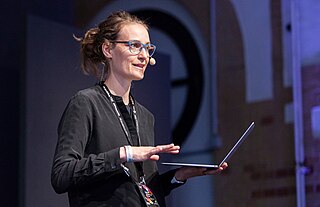Social shopping is a method of e-commerce where shoppers' friends become involved in the shopping experience. Social shopping attempts to use technology to mimic the social interactions found in physical malls and stores. With the rise of mobile devices, social shopping is now extending beyond the online world and into the offline world of shopping.
Trustpilot Group plc, is a Danish consumer business operating a review website founded in Denmark in 2007 which hosts reviews of businesses worldwide. Nearly 1 million new reviews are posted each month. The site offers freemium services to businesses. It has been criticised for the publication of fake reviews, and allowing companies to remove negative reviews. Trustpilot is listed on the London Stock Exchange and is a constituent of the FTSE 250 Index.
Flipkart Private Limited is an Indian e-commerce company, headquartered in Bangalore, and incorporated in Singapore as a private limited company. The company initially focused on online book sales before expanding into other product categories such as consumer electronics, fashion, home essentials, groceries, and lifestyle products.
Snapdeal is an Indian e-commerce company, based in New Delhi, India. It was founded in February 2010 by Kunal Bahl and Rohit Bansal.
Polyvore was a community-powered social commerce website headquartered in Mountain View, California. The company's virtual mood board function allowed community members to add products into a shared product index, and use them to create image collages called "Sets". They could browse other users' sets for inspiration, share sets with friends and interact with people through comments and likes. Due to the visual nature of the tool Polyvore was mostly used to build sets in the fields of home decoration, beauty and fashion. Online retailers, too, could upload their product images to Polyvore and link back to their product pages or use Polyvore to encourage users to showcase their products through such activities as board creation competitions.

FundRazr is a free crowdfunding and online fundraising platform released in 2009. FundRazr operates internationally in 35+ countries with the largest markets being United States, Canada, United Kingdom and Australia. It allows users to run a wide-range of crowdfunding campaigns by creating fundraising pages and sharing it via social media, messaging apps, email and more to raise money for over 100 types of causes such as nonprofit, medical care, education, community help, poverty alleviation, arts, memorials, and animal rescue causes. FundRazr also works with more than 4000 nonprofits, charities and social enterprises with an advanced fundraising toolset for free. The digital fundraising platform provides 8 different campaign types. They include microproject fundraising, peer-to-peer campaigns, wishlist campaigns, recurring donations, branded sponsorship campaigns, DIY projects, sweepstake campaigns, and storefront campaigns.

Tictail was a social shopping website for shoppers to discover emerging designers around the world. For brands, the platform was a DIY e-commerce tool focused on strong community integration, simplicity of use, and attractive, customizable design. With no need for coding or web-design experience, small business owners were given the tools to build global brands. For shoppers, Tictail was a destination to discover and shop home decor and fashion finds from a global community of emerging designers. Founded in Stockholm, Tictail currently has offices in both Sweden and New York where it opened its first brick-and-mortar store in January 2016. In November of 2018, Tictail was sold to Shopify. The acquisition by Shopify also resulted in Tictail’s brick-and-mortar store in New York City closing.
Freecharge is an Indian financial services company based in Gurgaon. It allows users to pay bills such as electricity, gas and telephone, as well as recharge mobile, broadband, DTH and metro cards.

Versive was a machine learning startup based in Seattle, Washington, US. Founded in 2012 by Stephen Purpura and Chris Metcalfe, the company sells on-premises software, cloud services, and professional service solutions to help businesses automate human expertise.

Musement is an online platform for activities, tours, museums, shows and art events which launched in March 2014. a service initially focused in Europe and then progressively expanding to the rest of the world. Musement aggregates third-party activities and tickets for users to book online. Tour suppliers have access to upload and manage various activities through the platform. The company's offers are available via website, iOS and Android. Once a customer books an activity, they receive a digital voucher or e-ticket for the reservation which can be saved on their device or printed. The company has four major competitors in this market, Viator, GetYourGuide, Berlin-based startup, Klook, Hong Kong–based startup, and Peek.com, a U.S.-based startup. The headquarters are located in Milan.
Activate is a platform that allows users to read and organize blogs on mobile and desktop. It is a design-focused platform that aggregates feeds from sources with RSS feeds, allowing users to discover and organize content. Activate has apps on both iOS and Android. As of April 2014, Bloglovin reached over 16 million global users monthly.

Dolls Kill is a global online fashion brand. The company was named the "Fastest Growing Retailer" in 2014 by Inc. magazine, which also included Dolls Kill as one of the "top companies in San Francisco". Dolls Kill operates a retail website that sells clothing, shoes and accessories and features six collections showcased by "Dolls", models that embody character personas for each collection's style. Dolls Kill is known for featuring kawaii, punk, goth, streetwear and festival fashions. Since 2018 it has also licensed and operated the 1990s brand Delia's as a sub-label.

Slyce Inc. is a visual search and recognition company headquartered in Philadelphia, Pennsylvania, with operations in New Waterford, Nova Scotia. The company developed image recognition technology that can identify products based on a picture and allow the user to purchase the item on their smartphone. The company has partnered with a number of retailers in the United States and Europe to operate its technology inside their mobile applications, including Neiman Marcus, Best Buy, and Home Depot. The company also operates two other mobile apps, Craves, and SnipSnap.
Chope is a real-time restaurant-reservation booking platform that connects diners with its partner restaurants. The name “Chope” was inspired by the term chope spoken colloquially in Singapore. Chope charges restaurants fixed and per-diner fees for the use of its table booking system.

Jet.com was an American e-commerce company headquartered in Hoboken, New Jersey. The company was co-founded in 2014 by Marc Lore, along with Mike Hanrahan and Nate Faust. Jet.com raised $820 million over four venture rounds from GV, Goldman Sachs, Bain Capital Ventures, Accel Partners, Alibaba Group, and Fidelity. The website was formally launched in July 2015. In September 2016, it became a subsidiary of Walmart.
Nykaa is an Indian e-commerce company headquartered in Mumbai. It sells beauty, wellness and fashion products through its website, mobile app, and over 100 physical stores. In 2020, it became the first Indian unicorn startup headed by a woman.

EDITED is a retail intelligence company headquartered in London, England with offices worldwide including New York and Texas. The company produces real-time data analytics software intended for brands and retailers. Its products range across Market Intelligence to monitor the retail market worldwide for apparel, homeware and beauty products; Enterprise Intelligence to provide business analytics across ecommerce, physical stores and omnichannel teams; and Automation that combines signals from Market and Enterprise Intelligence. Its software is primarily used by apparel buyers, traders and merchandisers; however, anyone across a retail business from design to C-suite can use EDITED.

Yaoota is an Egyptian search engine for products sold online in Egypt. The engine, which was referred to by Forbes as the “Egyptian Version of Google Shopping”, made headlines in October 2015 upon securing the largest Series A investment in Egypt from UAE-based private equity KBBO Group, only one year post-launch. It was also featured in a separate Forbes ranking as number 2 of the 20 Most Promising Egyptian Startups. The choice of the name Yaoota, which translates roughly to “Crazy Tomatoes”, mirrors the Egyptian culture, which relies on an all too familiar street vendor shout out in street markets that mocks the volatility of tomato and vegetable prices.

Founded in 2012, Mallzee is a fashion mobile commerce company and shopping application. Its application allows online shoppers with a smartphone to access millions of products from over 100 fashion brands around the world. The mobile app was launched in September 2013 and uses a 'like' or 'dislike' swiping interface and has since been labelled as the 'Tinder of fashion', in reference to the Tinder app. In 2015, the application was launched in the US.

Ida Tin is a Danish internet entrepreneur and author who is the co-founder and CEO of the women's menstruation-tracking app, Clue. She is credited with coining the term "femtech".











